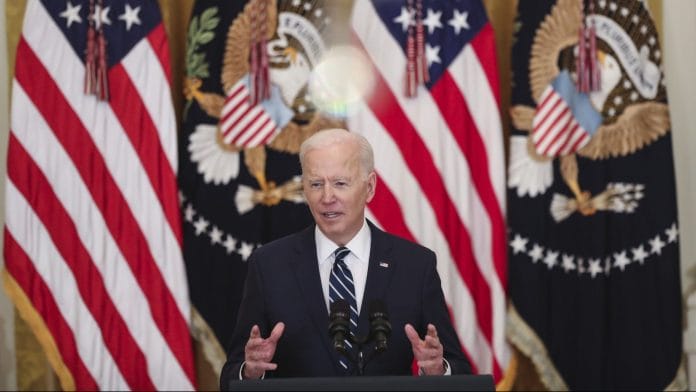Washington: President Joe Biden on Thursday promised to outspend China on innovation and infrastructure to prevent it from overtaking the U.S. to become the world’s most powerful country.
But at his first news conference since taking office, Biden declined to say whether he would keep tariffs in place on the majority of Chinese imports or ban products made from forced labor.
“I see stiff competition with China,” Biden said at the White House. “They have an overall goal to become the leading country in the world, the wealthiest country in the world and the most powerful country in the world. That’s not going to happen on my watch, because United States is going to continue to grow and expand.”
“I see stiff competition with China,” Biden says, adding that he doesn’t agree with that country’s goal of becoming “the leading country in the world, the wealthiest country in the world and the most powerful country in the world.” ⁰⁰“That’s not going to happen on my watch.” pic.twitter.com/tlX2ZQUOhW
— Bloomberg Quicktake (@Quicktake) March 25, 2021
Biden is just beginning to establish his relationship with China, the world’s second-largest economy, after former President Donald Trump imposed tariffs and sanctions and blamed Beijing for the spread of the coronavirus.
Biden’s comments came days after U.S. Secretary of State Antony Blinken, National Security Advisor Jake Sullivan and their Chinese counterparts traded criticism on human rights and national security issues during a two-day face-to-face meeting in Alaska.
Blinken said the U.S. raised concerns over issues including China’s crackdowns in Xinjiang, Taiwan and Hong Kong, as well as its cyber-attacks. Yang Jiechi, a member of the Communist Party’s Politburo, blasted what he described as American hypocrisy and called the U.S. the “champion” of cyber attacks.
China on Friday sanctioned nine British individuals, including members of Parliament, and four entities in retaliation for U.K. moves over Xinjiang. The individuals and their relatives are banned from entering the country or trading with Chinese citizens and institutions, the Foreign Ministry said in a statement. China had earlier retaliated against sanctions from the European Union.
On Thursday, Biden refused to answer a question about whether he is more likely now than before entering office to keep in place tariffs on Chinese imports, or whether he is considering banning products that are produced with forced labor in China’s Xinjiang region.
“Look, they’re each specifically legitimate questions but they only touch a smidgen of what the relationship with China really is about,” he said.
Biden said the U.S. values human rights and he would continue to work with allies to call out China’s violations in its treatment of Uyghurs and its actions in Hong Kong.
“The moment a president walks away from that, as the last one did, is the moment we begin to lose our legitimacy around the world,” he added.
The U.S. president said he intends to invite “an alliance of democracies” to the White House “to discuss the future” and make sure everyone is on the same page with respect to China and other issues.
The Biden administration is still developing its overall China strategy, including how it will treat Chinese technology firms and a trade deal negotiated by the Trump administration.
The new administration has said it will compartmentalize its engagement with China — approaching the relationship from a competitive standpoint when necessary and working with Beijing on matters like climate change and North Korea. The U.S. is also emphasizing working with allies instead of acting alone.
So far, the Biden team is maintaining the same tough line that Trump took on Beijing’s economic and human rights practices.
The Commerce Department this month issued subpoenas for several Chinese communications firms and is adopting a Trump administration rule to block transactions involving Chinese goods and services in the information and communications technology supply chain.
The Biden administration in concert with European partners this week announced sanctions on Chinese officials for alleged human rights violations against the Uyghur Muslim minority. Beijing has denied allegations of such abuses and continues to lash out at the international community for spreading what it considers lies.
The president also has signed executive orders aimed at boosting American manufacturing and strengthening critical U.S. supply chains, including for semiconductors and rare earths — for which the U.S. is heavily dependent on other countries, including adversaries like China.- Bloomberg
Also read: India, US to re-establish Homeland Security Dialogue discontinued by Trump






